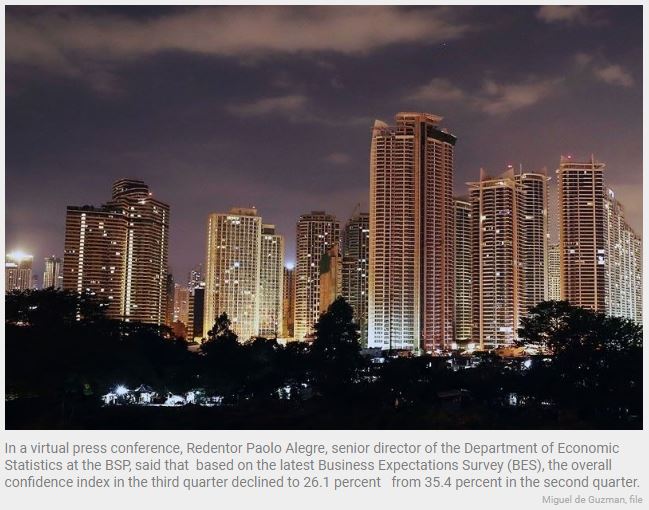Philippines: Consumer, business confidence sinks in Q3 on inflation worries
MANILA, Philippines — Business and consumer confidence fell in the third quarter on the back of elevated inflation, rising fuel prices, the weak peso as well as higher household expenses and lower income, according to the Bangko Sentral ng Pilipinas (BSP).
In a virtual press conference, Redentor Paolo Alegre, senior director of the Department of Economic Statistics at the BSP, said that based on the latest Business Expectations Survey (BES), the overall confidence index in the third quarter declined to 26.1 percent from 35.4 percent in the second quarter.
Alegre said the lower confidence index was due to the combined effects of a decrease in the percentage of optimists and an increase in the percentage of pessimists.
The survey was conducted from July 6 to Aug. 15 covering 1,504 respondents.
Alegre attributed the respondents’ less optimistic sentiment for the third quarter to higher inflation, rising fuel prices, decline in sales and demand as well as the depreciation of the peso against the dollar and the continuing public health threat of COVID.
According to Alegre, the confidence index across all sectors moderated from July to September, indicating that business sentiment of firms in the construction, services, wholesale and retail trade and the industry sectors were less positive compared to the previous quarter’s survey results.
“The firms’ less upbeat outlook in the third quarter across all sectors was attributed to the impact of higher prices on business operations, specifically the prices of fuel, electricity, raw materials and other inputs and equipment,” he said.
Additionally, he said that firms in the construction sector pointed to bad weather conditions for their less optimistic view.
Explaining their less buoyant sentiment, respondent firms in the services sector, particularly in the financial and business services sub-sectors, cited uncertainty over the new administration’s economic policies and low demand in the finance, hotel and hospital sub-sectors.
Meanwhile, Alegre said the less favorable outlook of the wholesale and retail trade sector was attributed to a decline in consumer demand.
Furthermore, the BSP official said business confidence for the fourth quarter also weakened for the second straight quarter to 43.9 percent from the previous quarter’s 46.4 percent, while the index for the next 12 months also declined further to 57.7 percent from 59.9 percent.
Businesses are expecting the peso to depreciate further against the dollar, while borrowing and inflation rates are expected to rise in the third and fourth quarters as well as the next 12 months as inflation is likely to breach the BSP’s two to four percent target range.
On the side of the consumers, Alegre said the results of the third quarter Consumer Expectations Survey showed the overall consumer outlook index remained negative, plunging further to -12.9 percent in the third quarter from -5.2 percent in the second quarter.
“The weaker confidence index among consumers in the third quarter was largely due to their concern over the faster increase in the prices of goods and higher household expenses, low income as well as fewer available jobs and working family members,” Alegre added.
The decline indicated that the number of households with pessimistic views increased and continued to outnumber those with optimistic views.
However, Filipino consumers turned more optimistic for the fourth quarter with the confidence index rising to 13.4 percent from 11.2 percent as well as for the next 12 months increasing to 33.4 percent from 32.4 percent.
“The improvement in confidence among consumers is attributed to their expectations of more available jobs, additional income, good governance, effective government policies and programs by the new administration on agriculture, education, and economic recovery from COVID as well as the provision of pension and financial assistance,” he said.
According to Alegre, consumers anticipated that interest rates may increase, the peso may depreciate against the dollar, and the unemployment rate may decline in the third and fourth quarters as well as the next 12 months.
Likewise, he added households also expected that the rate of increase in the prices of consumer goods and services may rise in the third and fourth quarters, stemming from concerns over higher household spending for food, utilities and other commodities, limited supply of goods and services, and depreciation of the peso.
The latest CES was conducted from July 1 to 13 and covered 5,546 households.
Source: https://www.philstar.com/business/2022/09/24/2211769/consumer-business-confidence-sinks-q3-inflation-worries-


 Thailand
Thailand




